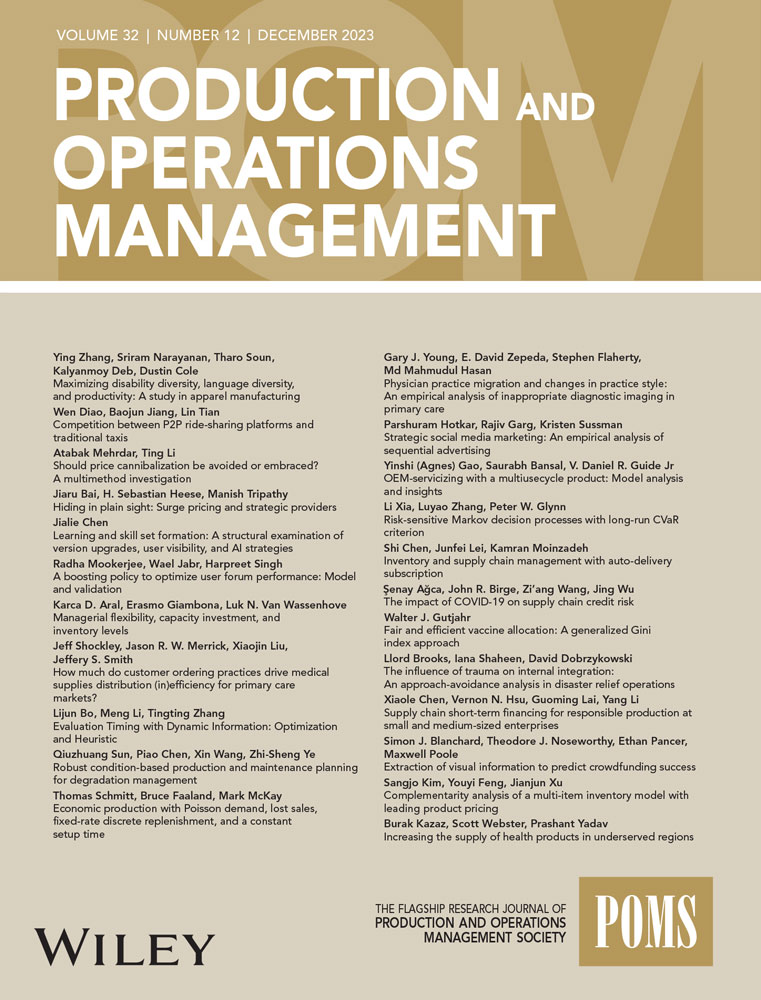解决运营管理中的分配变化:定制生产中的订单履行情况
IF 5.1
3区 管理学
Q1 ENGINEERING, MANUFACTURING
引用次数: 0
摘要
为了满足订单履行目标,制造商寻求优化生产计划。机器学习可以通过预测给定订单规格的生产线的生产时间来支持这一目标。然而,当制造商生产定制产品时,这是具有挑战性的,因为定制通常会导致操作数据概率分布的变化,即所谓的分布变化。当部署到具有新规格的未来客户订单时,分布变化可能会损害预测模型的性能。文献提供了有限的建议,如何分配的变化可以解决在运营管理。在这里,我们提出了一种基于对抗性学习的数据驱动方法,该方法允许我们考虑高度产品定制的制造环境中的分布变化。我们使用一个作业车间的实际数据对我们提出的方法进行了实证验证,该作业车间为石油平台建设场提供大型金属部件。在一系列广泛的数值实验中,我们发现我们的对抗性学习方法优于普通基线。总体而言,本文展示了生产经理如何在分配变化下改善他们的决策。本文章由计算机程序翻译,如有差异,请以英文原文为准。
Addressing distributional shifts in operations management: The case of order fulfillment in customized production
To meet order fulfillment targets, manufacturers seek to optimize production schedules. Machine learning can support this objective by predicting throughput times on production lines given order specifications. However, this is challenging when manufacturers produce customized products because customization often leads to changes in the probability distribution of operational data—so-called distributional shifts. Distributional shifts can harm the performance of predictive models when deployed to future customer orders with new specifications. The literature provides limited advice on how such distributional shifts can be addressed in operations management. Here, we propose a data-driven approach based on adversarial learning, which allows us to account for distributional shifts in manufacturing settings with high degrees of product customization. We empirically validate our proposed approach using real-world data from a job shop production that supplies large metal components to an oil platform construction yard. Across an extensive series of numerical experiments, we find that our adversarial learning approach outperforms common baselines. Overall, this paper shows how production managers can improve their decision making under distributional shifts.
求助全文
通过发布文献求助,成功后即可免费获取论文全文。
去求助
来源期刊

Production and Operations Management
管理科学-工程:制造
CiteScore
7.50
自引率
16.00%
发文量
278
审稿时长
24 months
期刊介绍:
The mission of Production and Operations Management is to serve as the flagship research journal in operations management in manufacturing and services. The journal publishes scientific research into the problems, interest, and concerns of managers who manage product and process design, operations, and supply chains. It covers all topics in product and process design, operations, and supply chain management and welcomes papers using any research paradigm.
 求助内容:
求助内容: 应助结果提醒方式:
应助结果提醒方式:


